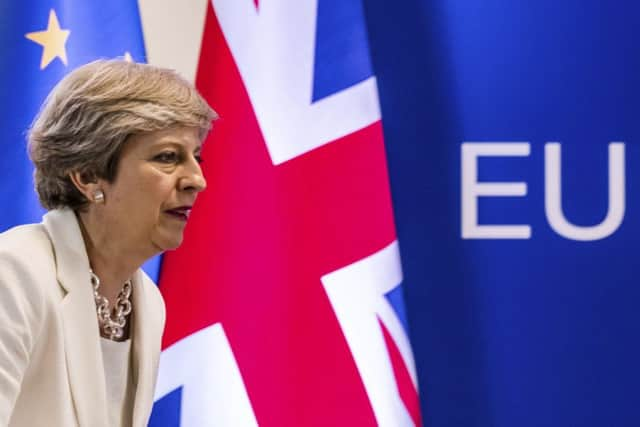Downing Street '˜doesn't recognise' report of £36bn Brexit bill


Sir Simon Fraser, who was the top civil servant at the Foreign Office until 2015, said Cabinet divisions had made it hard to establish a clear negotiating position and claimed the had been “a bit absent” from talks in Brussels.
His comments were rejected by the Prime Minister’s official spokesman, who insisted that “important progress” had been made in the first two rounds of talks in Brussels.
Advertisement
Hide AdAdvertisement
Hide AdDowning Street also played down weekend press reports that the Government was ready to pay a £36 billion ‘divorce bill’ to the EU in order to secure a free trade deal with the bloc after Brexit, following an angry response from some Tory MPs.
“We would disagree strongly,” the spokesman said in response to Sir Simon’s comments. “The last two months, we have had a constructive start to the negotiations. We have covered a significant amount of important ground.”
On the UK’s financial commitments to the EU, the spokesman said the UK had always accepted there would have to be a “fair settlement” but did not recognise the reported figure.
The SNP’s Europe spokesman at Westminster, Stephen Gethins MP said: “The contradictions and counter-briefings on this issue highlight the utterly shambolic state of this Tory government, and the dangers its damaging approach to negotiations with the EU poses to every part of the UK.
“The confusion and contradiction on this issue lays bare the total inconsistency and lack of strategy that risks the UK’s economy, job prospects, business security and opportunities for young people.”
The EU budget commissioner Guenther Oettinger warned yesterday that UK payments would have to continue after it left the EU in March 2019 as it would remain “bound” by previous commitments.
“London will therefore have to transfer funds to Brussels at least until 2020,” he told Germany’s Bild newspaper.
Downing Street said ministers had accepted that some obligations would “survive” the UK’s withdrawal and would have to be resolved.
Advertisement
Hide AdAdvertisement
Hide AdIn an interview with the BBC, Sir Simon, who now advises businesses on Brexit, said: “The negotiations have only just begun, I don’t think they have begun particularly promisingly, frankly, on the British side.
“We haven’t put forward a lot because, as we know, there are differences within the Cabinet about the sort of Brexit that we are heading for and until those differences are further resolved I think it’s very difficult for us to have a clear position.”
The government expected to publish further position papers in the next few weeks, setting out its views on customs arrangements and the Northern Irish border, which Sir Simon said would help demonstrate the UK is “ready to engage”.
“So far we haven’t put much on the table apart from something on the status of nationals, so we are a bit absent from the formal negotiation.”
Meanwhile, figures published by the Treasury have revealed the UK made a net contribution to the EU of roughly £156 million a week in 2016/17, the lowest level for five years. The total amount for the 12 months to March 2017 was £8.1 billion.
It is the first estimate for the period including the EU referendum on June 23, 2016.